10 Speaking on Special Occasions
Susana Powell, Ph.D. and Mark Janis, M.A.
Learning Objectives
- Distinguish between informative and persuasive speeches as taught in class, and special occasion speeches.
- Identify special occasions when you might be asked to speak.
- Prepare for presentations in academic, social and professional settings.
The good news is that when you have mastered the informative and persuasive speech skills taught in SPE 100 and SPE 102 (for non-native speakers), you will be well equipped to tackle presentations for special occasions. We sometimes refer to informative speaking as “telling” and persuasive speaking as “selling” (an idea, a concept, an advocacy).
Although you may think you want to avoid speaking on special occasions at all costs, it is usually an honor and a pleasure, once you accept the fact that you will not be asked to speak unless it appears you are eminently suited to do so.
Special occasion speeches fall into four categories: academic, advocacy, social and professional; but the same rules or guidelines apply: be prepared, be appropriate, be brief.
You have already discovered that being prepared is essential. You show disrespect to your audience if you are unprepared, and you want to feel confident, not embarrassed by your own performance. To be appropriate, you need to know your audience and the occasion, as well as the purpose of the speech you will give. As for brevity, a good short speech is always preferred to a good long speech, and the speech that leaves us wanting for more always receives the loudest applause.
The best known speeches in high school and college are valedictorian and salutatorian speeches given at graduation ceremonies. If you are invited to give such a speech – congratulations! You are probably top of the class with a perfect 4.00 GPA.
Both words comes from the Latin. One is a greeting (“salut”), and the other a farewell speech (“vale”) in which the valedictorian says “good-bye” to college on behalf of the student body. It is expected that the speaker will thank the institution and mention how education has helped overcome difficulties and prepare for a brilliant future. It’s also supposed to be inspirational – not an easy task when you think of the thousands of speeches made across the United States every summer. And the audience is not your comfortable classroom of fellow students, but a stadium or theater packed with thousands of fellow graduates and their parents, as well as honored guests on stage. So the stakes are high. But the audience is usually friendly and appreciative. If the large number of strangers makes you nervous, concentrate on one section where your family and friends are sitting; then make eye contact with individual groups of your fellow graduates.
Rather than give directions, which are cold and uninspiring, it is better to relate successful valedictorian experiences from BMCC’s past. And it gives me great pleasure to introduce a BMCC student valedictorian whom I coached, and who is now my colleague with whom I share an office. Yes, one of the most exciting things about BMCC is that you can truly “Start Here, Go Anywhere!” In this case, Mark Janis started as a student, earned his Associate degree, bachelor’s degree, and master’s degree, and returned to BMCC first as a tutor, then as an adjunct, and now as a full-time instructor. What follows, in his own words, is Prof. Janis’ story. [Please note that while most professors prefer their students prepare the BODY of the speech first, once the course is over you do what works best for you. In this case, Mark approached the outline chronologically: first the Introduction, then the Body, and last the Conclusion.]
The Big Day
It was the phone call I had been waiting for. It was the Dean of Student Services inviting me to deliver the valedictorian speech at commencement. I had been keeping up a 4.0 GPA all year, and this was an honor, a reward for all the hard work and study. But when I started to write my speech, I was lost. Some reward, I thought to myself, as I stared at the blank paper.
In speech class, I had gotten A’s on my speeches so I decided to go back to the basic outline: introduction, body, and conclusion. Yet, after over an hour, I had gotten no further than when I started. I never had problems with outlines before, so why was I having trouble with this one? I finally realized it was not the format that was the problem; it was that I didn’t know what a valedictorian speech actually was. I didn’t know what it should accomplish. I didn’t know what my specific purpose was.
I put down my pen and paper and went looking for an old speech book (a good example of why you should keep your old textbooks) and turned to the chapter on special occasion speeches. The chapter said that the valedictorian speech is a farewell to the school on behalf of all fellow students. The speaker can inject his personal experiences; however the speech itself should not be egocentric. In other words, I was not speaking for and about myself, but rather I was chosen as a representative for the entire graduating class, to speak for and about them. The chapter went on to say that the speech must also thank the school and explain how the school helped us, the students, in reaching our goals. It should conclude on an inspirational note.
Now that I had my specific purpose and a clear understanding of what the speech must contain, I was ready. I started to compose the outline and filled out what was needed in each section.
Introduction
I. Introduce myself as the representative of the graduating class.
II. Thank the guests and all who attended.
III. Relate common experiences to show how we got to where we are as a class.
The last one gave me trouble. In a graduating class of over 2000 students, how in the world would I ever know what each student’s experiences were, let alone find the ones that we all shared? I started thinking about how we started the school year in late August. Hurricane Katrina had destroyed New Orleans weeks earlier. I remembered that our finals in December were postponed for two weeks because of a subway strike that shut down our city. We were in the middle of the Iraq War that sent our gasoline and fuel prices sky high. “Jeez”, I thought, “I can’t speak about such negative, depressing things. It’s a wonder any of us were able to make it through the school year.” After a while, I realized that it was indeed an accomplishment that we made it through such a year and we should be proud of that. My introduction was done. On to the body.
I knew the body was the point in the speech where I was to thank the college faculty and staff; but if I just thanked them, it would not be much of a body. This is where I could inject my own experiences of what fellow students, a college education, and the professors mean to me; in the process, I would be thanking them as well. I now had my three main points:
Body
I. Speak about positive things I have seen students do.
II. Remind the audience of the results and advantages of a college education.
III. Explain how teachers are invaluable because of the information they provide us.
Knowing that the body was the longest part of the speech and knowing I was facing 2000 students who wanted to get their diplomas and start celebrating, it was essential I keep the attention level high. The best way to do that was to tell a story that would keep the listeners interested. This is the part of the speech where I could get creative and even emotional (but not too emotional). After all, I didn’t want to break down in the middle of Madison Square Garden.
I knew that the conclusion of any speech needs a really good power punch ending. I wanted my listeners to feel inspired when they left, but I did not want to use any well-known sayings or cliches. (I actually had a professor come up to me before the speech and say he hoped there was no mention of “reaching for the stars” in my speech!) I wanted to inspire others toward something that they could actually do but may never have considered. If I could find a suitable quote, then I would have my power punch ending.
Conclusion
I. Signal the conclusion.
II. Use quote and raise banner.
III. Say goodbye.
The next day, I was to meet with the chair of the Speech Department, Prof. Powell, and for the next two weeks she and I would work on the speech together. She confirmed that my specific purpose was correct and was pleased with my main points, but she wanted to know what I would use as a visual aid. I must admit that I did not think this kind of speech needed one. But I also had to admit that with all the speeches I had heard in my speech class, it was the presentation aids that I remembered most. She suggested to me that I just repeat the school slogan–“Start Here, Go Anywhere!”–at the end of the speech and print it on a banner to hold up to the audience. It was just the thing I needed to end with a real punch.
The following is the speech I delivered to the BMCC class of 2006. It is because of what I learned in Speech 100 that I was able to present a well-organized, focused speech that satisfied the elements of a special occasion speech.
Good afternoon and welcome! As I stand here before you, keep in mind that I am only a representation of you, our fellow students. I only hope that the following words will do honor to the hard work you have accomplished here at BMCC.
I would like to thank all who came here today, especially our guests. More than likely, they are the same ones who have supported us while we pursued our work, studies, and associate degrees.
What a year this has been! We started the year in the aftermath of one of the nations’ worst natural disasters ever: Hurricane Katrina. We worked hard during the fall only to witness an MTA strike that shut down the city and delayed our finals for up to two weeks. We are ending this semester with skyrocketing prices of gas and merchandise, soaring rents here in New York City, and ongoing uncertainty in the Middle East. Through it all, BMCC has been our nook, shelter, our academic haven.
I came here as a 42 year-old freshman, but BMCC never made me feel any different than any other student. We truly have been part of a unique college. I have been in a class where the youngest student was 19 years old and the oldest was 72 years young. I have seen full-time workers who are earning their degrees walking into the building for classes on Saturday night and Sunday morning. I have seen mothers of all ages dropping off their children in BMCC’s daycare and going on to their classes with confidence that their child is in safe, caring hands.
When people speak of community colleges, they speak of a student body that is too busy with other parts of their life to concern themselves with other issues. They feel that we are just here to do our coursework and move on. To speak about our student body like that would be a mistake. I have seen you all during Wednesday club hours engaging one another in conversation and philosophy. I have seen students marching next to adjuncts fighting for higher pay and better benefits. I have seen you walk down Chambers Street to a recruiting station to protest the war, and I have seen you walk out of class and march up Broadway in support of immigrants. I have seen you in the early morning, boarding buses for Albany to lobby for more money for students with disabilities. I have seen you get involved. I have seen you care.
I came here in January 2005 after working for over twenty years in various occupations. They were quite different from one another but they all had one thing in common: competition. I am not talking about competition among businesses. That I expected. What I did not expect was competition among fellow workers. I entered the workforce in the decade whose motto was “information is power.” Information was the weapon of choice people used against one another. If you had knowledge about something, you kept it to yourself, with the thought that if you teach what you know to someone, that someone might take your job one day. I was selfish with my knowledge in order to survive.
As I stood outside BMCC on my first day of classes, I watched the other students walk by as I sized up what I perceived as my competition. I vowed that not only would I be selfish with my knowledge but also that I would obtain knowledge from others by whatever means necessary.
I kept up this vow for the first three weeks of the semester when I found myself entering the library for the first time to do some research on William Faulkner. As my feet made their way across the carpeted floor, my eyes were drawn to the shelves of books. As I walked by rows and rows of columns and columns of shelves and shelves, it struck me. I looked all around me at the books filled with knowledge right there for the taking. Pages and pages of information with answers to any question I could possibly come up with right there! At my fingertips. If I chose to, that day alone, I could have learned how to solve a linear equation, how to conjugate an irregular Spanish verb, the impact of the reform act of 1884, and the reason why the caged bird sings.
I learned in Astronomy 110 that we are made up from the sun. All the elements that our bodies contain–magnesium, iron, hydrogen–came from the core, the center of the sun. But after our bodies are formed, where do we receive the elements to fill our brains, our minds?
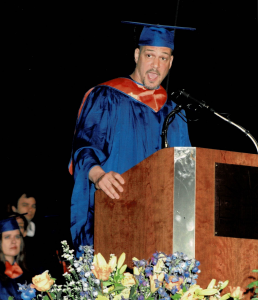
(Turn to professors)
It is these suns that give off information, knowledge. It is these administrators, teachers, instructors, professors, who are releasing energy from the core, the center of their minds; and in the same way that a new star begins its formation by grabbing hold of stellar dust, we grab hold of their stellar knowledge. And one day, it will be our turn to release our energy of knowledge to others.
I am not here to ask that you all become certified teachers. What I am asking is not to be selfish with your knowledge. Teach others in any way you can. Give generously of your knowledge. To quote Chaucer’s Canterbury Tales : “And gladly would he learn and gladly teach.”
I find it only fitting to close this address with a quote that we have all seen everywhere from our course catalogue to the banner that faces the Hudson River.
(Pick up banner.)
“START HERE. GO ANYWHERE.”
BMCC has given us a strong start. And because of this, we can indeed go anywhere.
Thank you! Good luck! And have a brilliant life.
Appropriately, Mark’s photograph, together with the slogan, was used on BMCC publicity material, and we would often see him posted in subway trains in his graduation gown!
Another memorable valedictory speech came from “Joon” in 2002, and it almost didn’t happen. When I contacted Joon about coaching him in his speech, he waited so long to reply that I suggested someone else be selected. His reply was that as a non-native speaker of English (from South Korea) he was very nervous, and he had hated his speech class, even though he earned an “A”! Here, then, was the very material to share and bond with his audience: all students are nervous about public speaking and many hate taking speech classes!
Graduating in 2002, Joon was part of the senior class that suffered the devastation of 9/11, so it was appropriate to mention the six BMCC students and two former students who died at the World Trade Center. He did not know them personally, but I suggested he held up a photograph of those eight students. This was then taken up by the keynote speaker Hillary Clinton, then a New York Senator, and also featured in The New York Times and The Daily News. So, a student who was reluctant to speak at all made lemonade out of lemons and delivered a valedictory speech worthy of media coverage.
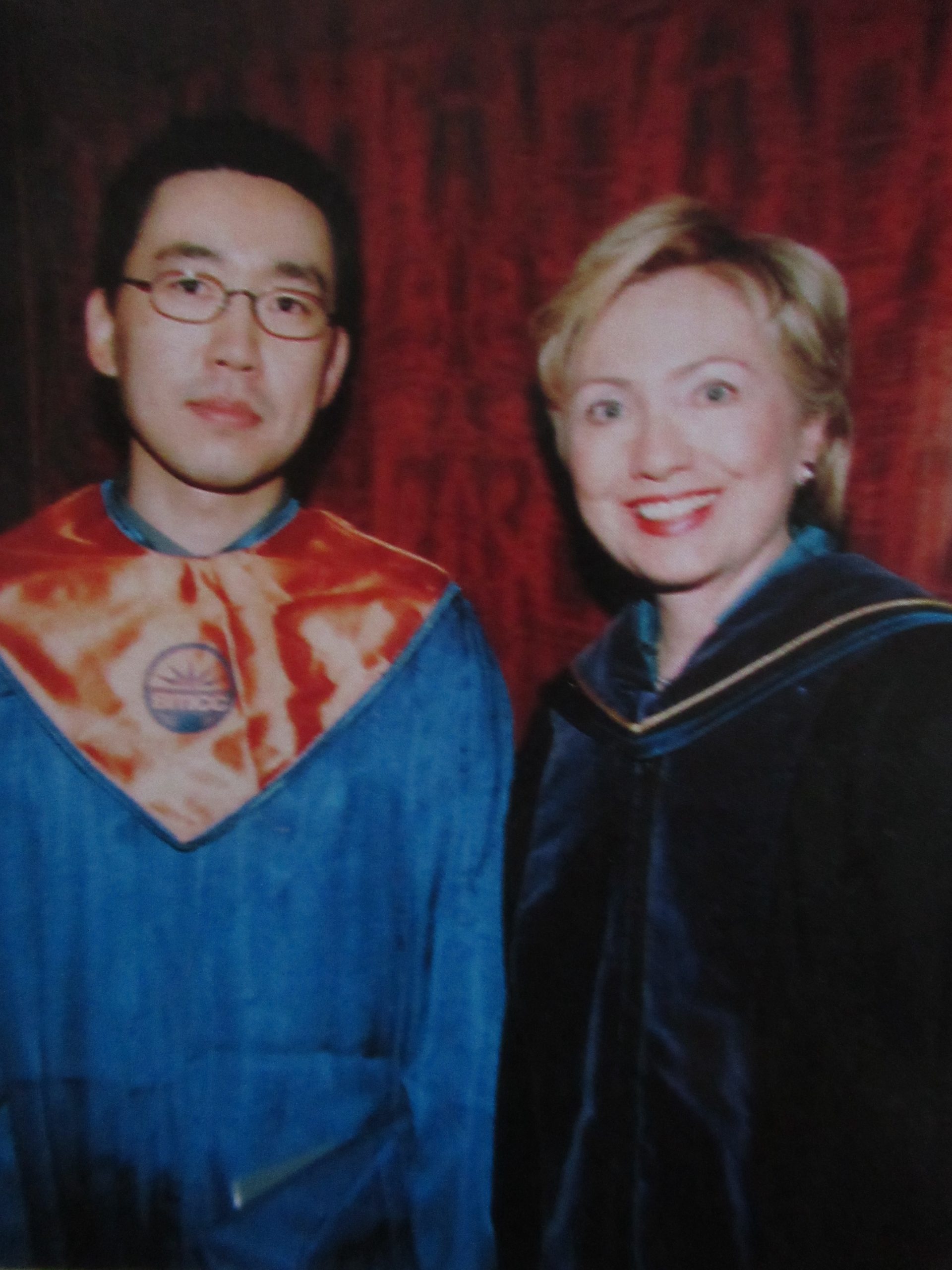
Valedictorians are not the only students called upon to speak in public. In a memorable fund-raising speech in 2004, honors student Aubrey Sebayoni, a black South African scholarship recipient who came to the U.S. as a welterweight boxing champion, talked about his struggle, his opportunity and his dream, and urged patrons to make large donations to the BMCC Scholarship fund.
Like Joon, Aubrey was not keen on accepting the invitation to speak to prospective donors with a background so different from his own. I persuaded him to tell his own story, which was so compelling. However, his first draft was long and rambling; so our job was to cut his outline down to a short story that really hit home. He was so successful that a record dollar amount was raised at the Gala, and Aubrey was invited to be a guest speaker for Con Edison, and then offered a job with Smith Barney.
Advocacy
Because of BMCC’s close proximity to City Hall, the college is often the base for CUNY demonstrations when our budgets are predictably cut almost every year. Student Government members often organize marches and take part in rallies which demand public speaking of a different nature. Notable student advocates have included Reggie Mason, Melissa Balthazar, and Orville Ingram.
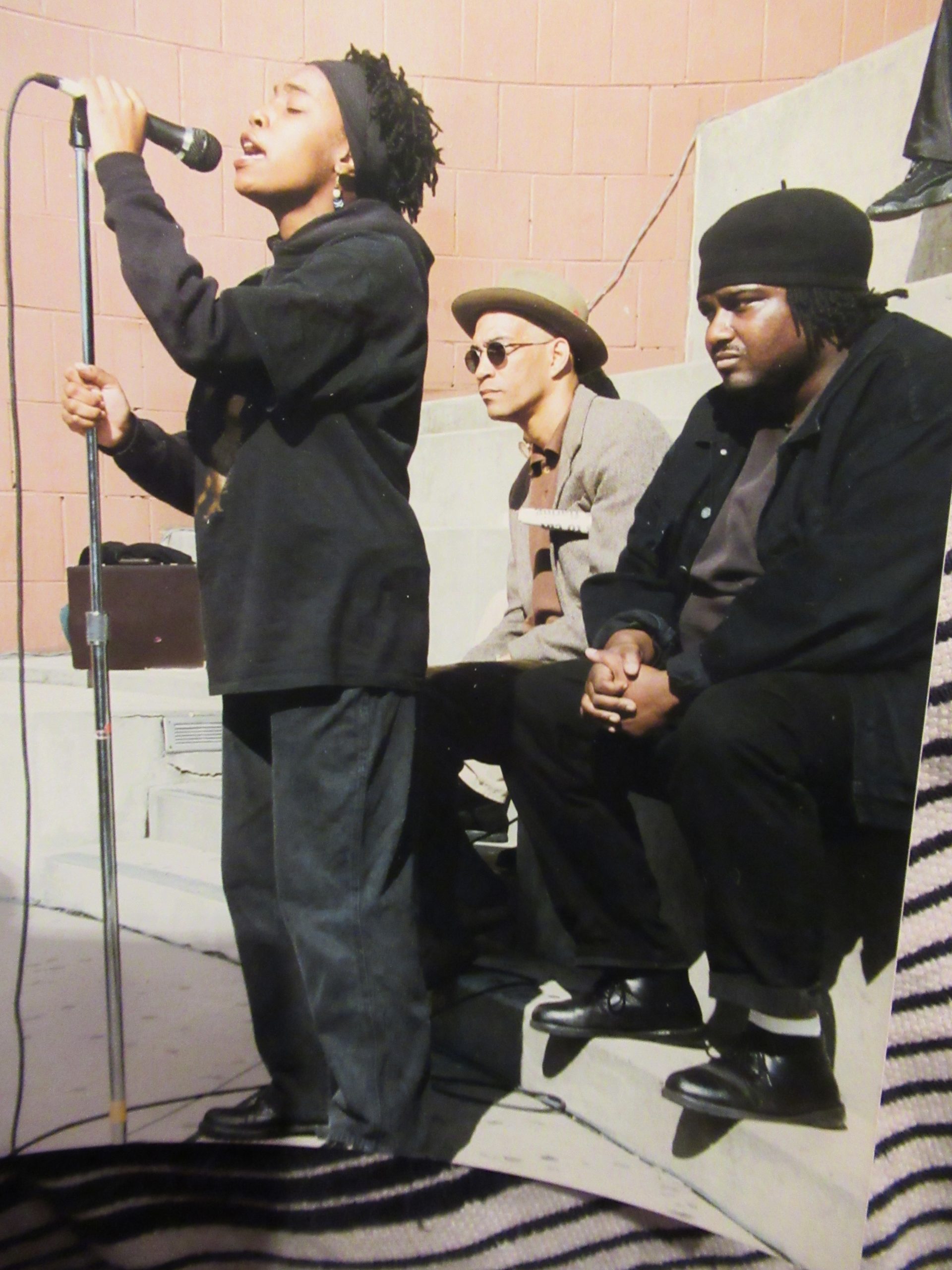
In an interesting turn of events, Student Government Association President Reggie Mason once turned the tables on me, his speech professor. At a City Hall Park rally with thousands of demonstrators, he pulled me up on stage and handed me the bullhorn, when I had not expected to speak. Dressed in an academic gown for the march, I mentioned that older CUNY graduates had the opportunity for free or low cost tuition, and made the chance remark: “It’s YOUR turn now.” Miraculously, I heard students chanting back “It’s OUR turn now!” Needless to say, I repeated the slogan, heard it bellowed back again, and then left the stage, grateful for a truly good exit line.
Inside City Hall, testimony is very strictly controlled. Speakers usually have only two to three minutes to make their point, and a huge clock ticks away the time like an oven-timer. When time is up, the speaker is thanked for his /her testimony and expected to stop. If not, the microphone is turned off. Remember the old saying: “time is money!”
Social Events
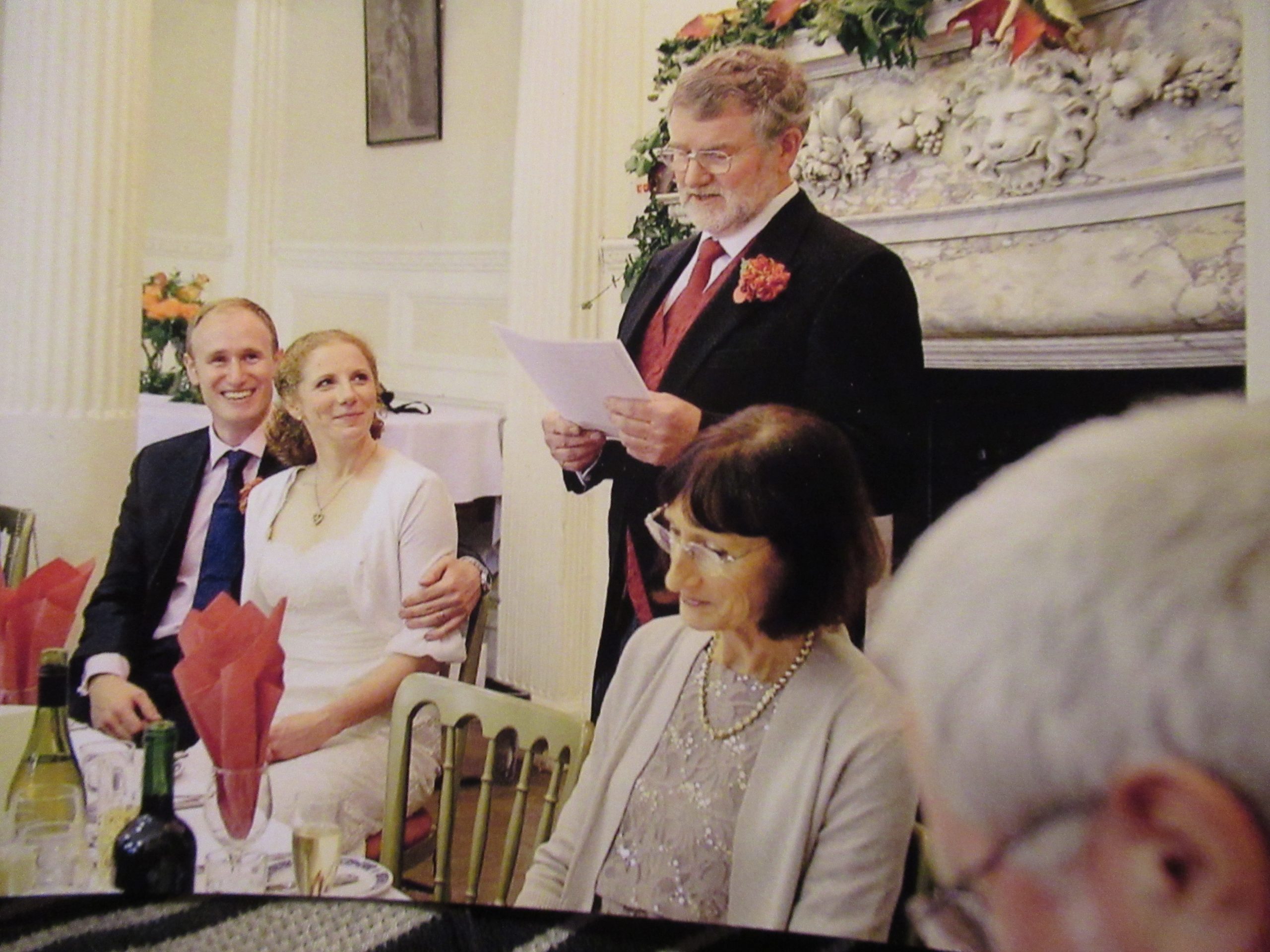 Timing is also important in speeches for social events such as weddings, when celebrants want to be eating, drinking, and dancing rather than listening politely. Because members of the wedding party usually know each other well, it is tempting to tell off-color jokes or stories of bad behavior. Such temptations may be acceptable at bachelor/ette parties, but not at wedding receptions where several generations of the partners’ families may be present. Don’t say anything you would not say to your own grandmother. Rather than striking a note of hilarity, with the goal of entertaining, aim for the shedding of a tear, marking the end of one life and the beginning of another. It is too easy to get a laugh at the expense of the couple being married, and the ensuing embarrassment will be magnified when the glow of champagne no longer dulls the senses. Remember, these are “feel good” experiences, not stand-up comedy routines.
Timing is also important in speeches for social events such as weddings, when celebrants want to be eating, drinking, and dancing rather than listening politely. Because members of the wedding party usually know each other well, it is tempting to tell off-color jokes or stories of bad behavior. Such temptations may be acceptable at bachelor/ette parties, but not at wedding receptions where several generations of the partners’ families may be present. Don’t say anything you would not say to your own grandmother. Rather than striking a note of hilarity, with the goal of entertaining, aim for the shedding of a tear, marking the end of one life and the beginning of another. It is too easy to get a laugh at the expense of the couple being married, and the ensuing embarrassment will be magnified when the glow of champagne no longer dulls the senses. Remember, these are “feel good” experiences, not stand-up comedy routines.
Similarly, if you are unfortunate enough to lose a loved one, and are asked to give the eulogy at a funeral, make sure you praise the deceased, and don’t dwell on problems, mistakes and indiscretions. The emphasis should be on the positive attributes of the deceased, and the contributions made to family or community. Fond memories will be appreciated, but grudges should not go beyond the grave.
On a lighter note, if you have the good fortune to receive an award, you need to acknowledge the institution that gives it, as well as your fellow recipients or competitors. Try to avoid the Oscar syndrome, in which you emulate the breathless and often inarticulate list of Academy Award “thank you’s”, and remember that if you use the occasion to propagate your pet cause, the results may be mixed. Recently, Black Lives Matter advocates have successfully spread their message widely, in unexpected places and occasions. But there can be a backlash, as demonstrated in many instances in the news. So you need to evaluate the advantages of spreading your message to a wide audience and weigh it against angry reactions. Such luminaries as Marlon Brando, Vanessa Redgrave, Jane Fonda and Michael Moore often lost work as a result of speaking out for social justice. And recently student valedictorians’ microphones have been cut when they advocated for transgender youth and abortion rights. In my opinion, this should not stop you from spilling advocacy into a social occasion. You should be aware, however, that this is controversial, and be prepared to stand up for your free speech rights, despite the consequences.
Introducing and/or Thanking a Speaker
Be brief and be gracious. Make sure your research includes the highlights of the speaker’s accomplishments relevant to the occasion. Take notes during the speech so you can refer to salient points at the end and show that you were really listening.
Professional Settings
You can be confident that once you have mastered the basic aspects of public speaking taught in SPE 100 and SPE 102 (for non-native speakers) you have the skills to carry you into your career. If called upon to give a report on the job, all the presentation tips you have learned will apply. Just make sure you know your audience, and analyze the space and technology available to maximize your proficiency.
If you are leading a group discussion, make sure everyone has a chance to contribute by asking questions of the silent members, and suggest that the least eloquent take notes to ensure inclusion. Be clear from the offset what is the expected outcome, and limit the time of those who always like to hear their own voices – respectfully but firmly. This is even more important if you are moderating a panel or symposium: an early speaker exceeding time limits will impact later speakers and lead to disgruntled speakers and audiences.
“This does not apply to me.”
You may think you will never be called upon to give a speech outside the classroom. You may be so glad that you never have to give another presentation, that you can accept your grade and throw away your notes. But think again! Don’t you want to speak out when you witness social injustice? Surely the #MeToo and “Black Lives Matter” movements have shown us that we do not need to be politicians or professional speakers to insist on change, reform, and justice for all? Your own lived experience in your own community may provide you with a story that inspires and helps others. You have the skills so speak up and be heard!
Glossary of Special Occasion Speech Terms
Pro Tip
Whatever the occasion, be sure to ask how long your presentation should be, who else is speaking, in what order, as well as the purpose of the speech. Then prepare slightly under the time-frame.
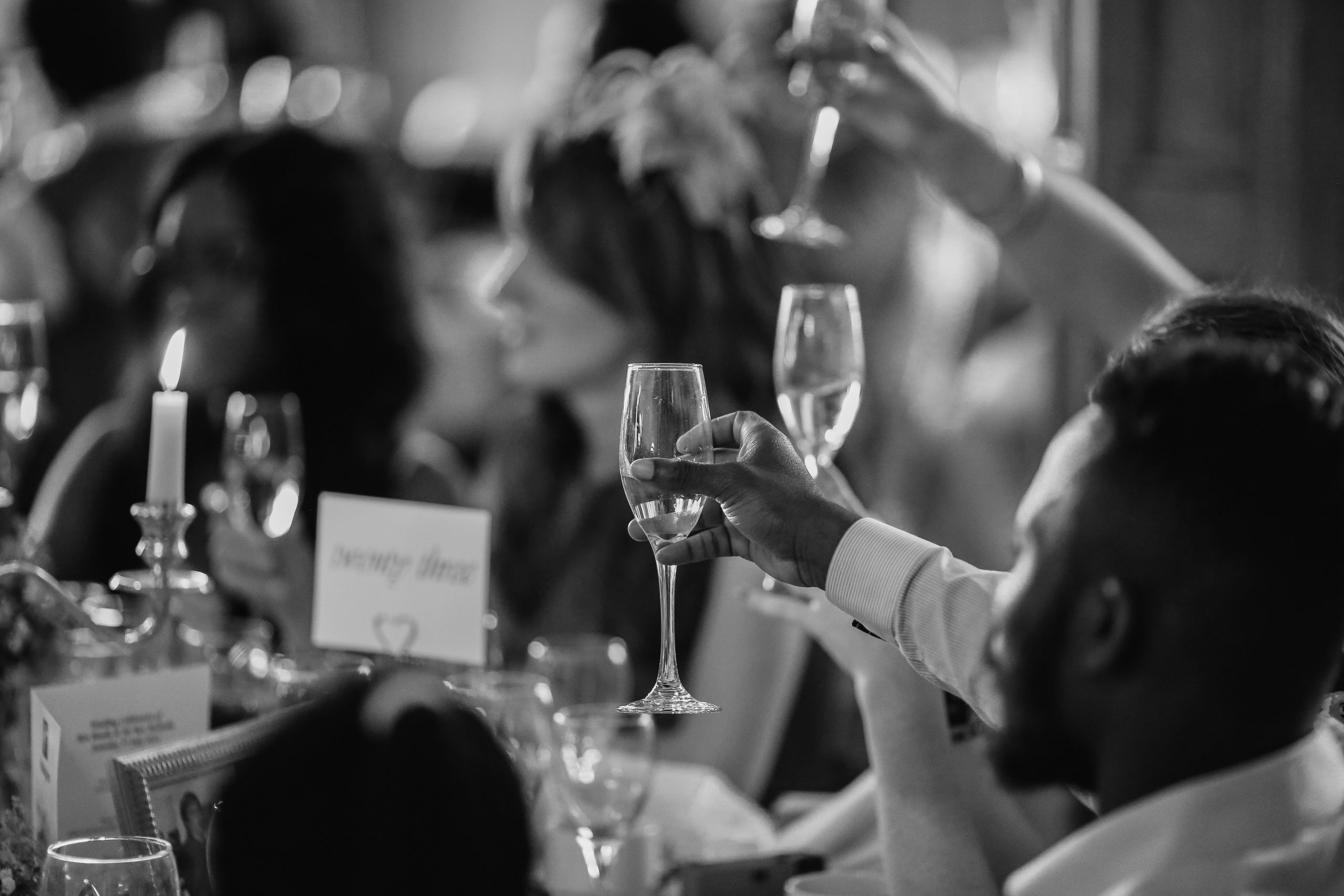
Toast Honors a person or an event.
Roast Honors through light-hearted criticism.
Advocacy Reveals social injustice and suggests reform.
Welcome Welcomes a guest speaker or the audience.
Introduction Introduces a guest speaker to the audience.
Acceptance Gives thanks for an award or promotion.
After-dinner (or any meal) Serious or light-hearted to a group.
Keynote The main speech at a meeting.
Eulogy A funeral speech honoring the deceased.
Salutatorian Welcome speech at Commencement.
Valedictory Farewell Speech on behalf of the student body at Commencement.
Symposium Short academic discussion.
Panel Longer academic discussion.
Review Questions
- What are the audience expectations of a valedictorian speech?
- How can student advocates effect change?
- What are the pitfalls to avoid in speeches at a wedding reception?
Class Activity
Share experiences of giving or hearing special occasion speeches: what worked and what didn’t? Why?
Works Cited
Lukpat, Alyssa. “When a Valedictorian Spoke of His Queer Identity, the Principal Cut Off His Speech.” The New York Times. 6/27/21.
Hauser, Christine. “As Texas Abortion Law Nears, Opponents Amplify a Valedictorian’s Speech.” The New York Times. 6/3/21.

